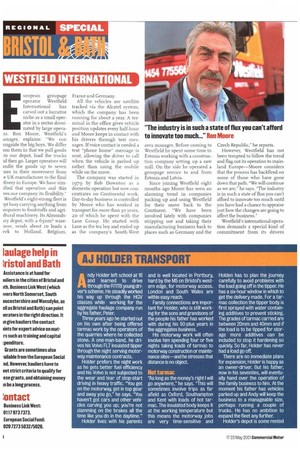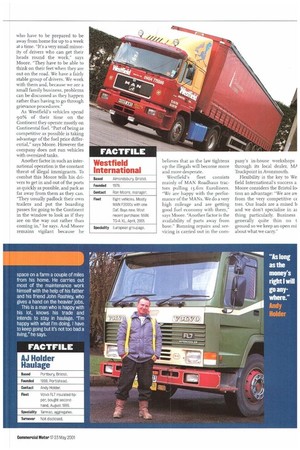WESTFIELD INTERNATIONAL
Page 40

Page 41

If you've noticed an error in this article please click here to report it so we can fix it.
European groupage operator Westfield International has carved out a lucrative niche as a small operator in a sector dominated by large operais, Ron Moore, Westfield's lanager, explains: "We run ongside the big boys. We differ om them in that we pull goods to our depot, load the trucks id then go. Larger operators will indle the goods up to seven :nes in their movement from e UK manufacturer to the final Aivery in Europe. We have simified that operation and this ves our company its flexibility." Westfield's eight-strong fleet is tpt busy carrying anything from ,mputers to foodstuffs and agriiltural machinery. Its AlmondsHy depot, with a 650m2 ware)use, sends about io loads a eek to Holland, Belgium, France and Germany.
All the vehicles are satellite tracked via the Alcatel system, which the company has been running for about a year. A terminal in the office gives vehicle position updates every half-hour and Moore keeps in contact with his drivers through text messages. If voice contact is needed a text "phone home" message is sent, allowing the driver to call when the vehicle is parked up rather than using the mobile while on the move.
The company was started in 1979 by Bob Downton as a domestic operation but now concentrates on Continental work. Day-to-day business is controlled by Moore who has worked in transport for more than 30 years, zo of which he spent with the Lane Group. He started with Lane as the tea boy and ended up as the company's South-West area manager. Before coming to Westfield he spent some time in Estonia working with a construction company setting up a saw mill. On the side he operated a groupage service to and from Estonia and Latvia.
Since joining Westfield eight months ago Moore has seen an alarming trend in companies packing up and using Westfield for their move back to the Continent. "We have been involved lately with companies stripping out and taking their manufacturing business back to places such as Germany and the
Czech Republic,he reports.
However, Westfield has not been tempted to follow the trend and flag out its operation to mainland Europe—Moore considers that the process has backfired on some of those who have gone down that path. "We will continue as we are," he says. "The industry is in such a state of flux you can't afford to innovate too much until you have had a chance to appraise just how the changes are going to affect the business."
Westfield's international operation demands a special kind of commitment from its drivers who have to be prepared to be away from home for up to a week at a time. "It's a very small minority of drivers who can get their heads round the work," says Moore, "They have to be able to think on their feet when they are out on the road. We have a fairly stable group of drivers. We work with them and, because we are a small family business, problems can be discussed as they happen rather than having to go through grievance procedures."
As Westfield's vehicles spend go% of their time on the Continent they operate mostly on Continental fuel. "Part of being as competitive as possible is taking advantage of the fuel price differential," says Moore. However the company does not am vehicles with oversized tanks.
Another factor in such an international operation is the constant threat of illegal immigrants. To combat this Moore tells his drivers to get in and out of the ports as quickly as possible, and park as far away from them as they can. They usually padlock their own trailers and put the boarding passes for going to the Continent in the window to look as if they are on the way out rather than coming in," he says. And Moore remains vigilant because he believes that as the law tightens up the illegals will become more and more desperate.
Westfield's fleet consists mainly of MAN Roadhaus tractors pulling 13.6m Euroliners. "We are happy with the performance of the MANs. We do a very high mileage and are getting good fuel economy with them," says Moore. "Another factor is the availability of parts away from base." Running repairs and servicing is carried out in the corn
pany's in-house workshops through its local dealer, MP Truckpoint in Avonmouth.
Flexibility is the key to We field International's success a: Moore considers the Bristol lo' tion an advantage: "We are aw from the very competitive cc tres. Our loads are a mixed b and we don't specialise in as thing particularly. Business generally quite thin on t ground so we keep an open ml about what we carry."


































































































